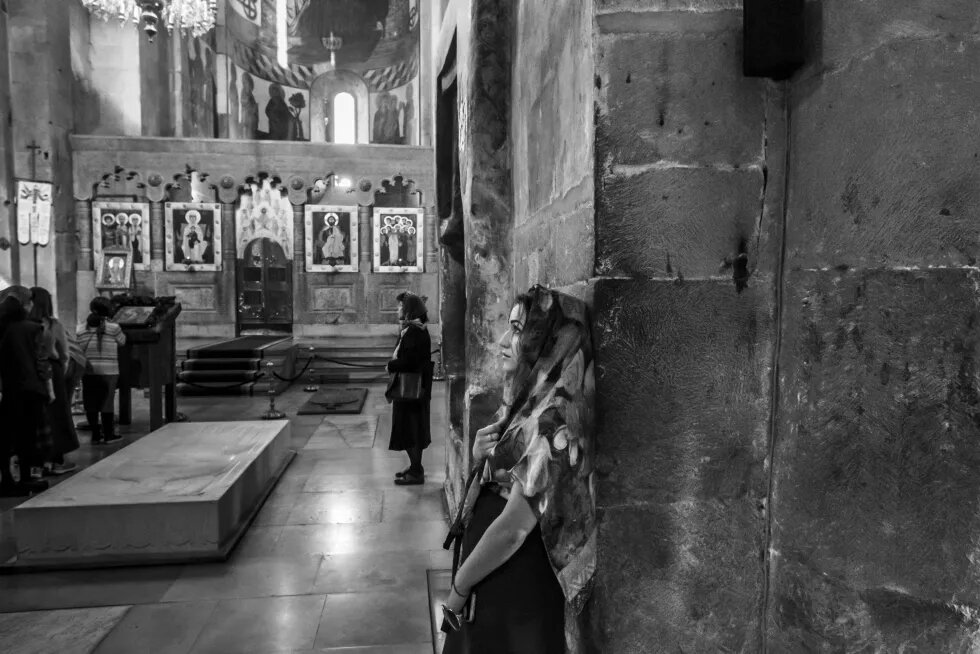
A pandemic like a litmus test
Some of the world’s most prominent intellectuals are busy predicting what the future will look like after COVID-19. This is a trendy topic today – one filled with so much hope and fear that it easily overshadows the not-so-attractive present, which has forced the governments of many countries around the world to admit that the same mistakes have been made in the recent past. These are the wrongdoings committed not just in any particular field of public policy rather towards the state itself, against its onus to ensure universal welfare and security, and against its social foundations.
The pandemic has become a litmus test to diagnose the ailments of contemporary states and political regimes. The state of emergency, which the pandemic brought about, also serves as a revelation demonstrating the political and social realities of the whole world without embellishment, which was impossible under normal circumstances. According to Carl Schmitt (1888-1985), a well-known German theorist on the state of emergency, who once again became a frequently cited author within the background of the ongoing pandemic, notes that a sovereign power, first of all, is seen in an emergency: “A sovereign is the one who decides on a state of emergency.” The very need for sovereign power, a force capable of making and enforcing operational decisions, is also manifested in a state of emergency, which is the only way to prevent chaos and return to normalization.
The crisis of sovereignty and its reasons
The first thing that appeared in Georgia on March 21, when the government declared the state of emergency, was the lack of sovereignty and sovereign power. The government was unable to extend its jurisdiction over the Georgian Orthodox Church. The Patriarchate of the Georgian Orthodox Church refused to change the sacramental communion temporarily, nor would it it suspend the practice of kissing crucifixes and icons. He also rejected the government’s insistence on forbidding the mass gathering of people for church services. In doing so, the Church found itself in complete disagreement with the state of emergency and the tightened quarantine norms imposed by the government. The state has no power to persuade the Church, nor has it been able to enforce the law to ensure everyone observes the law equally. It did not have the leverage. This situation has not only revealed the ability of the authority of the Church to operate above the power of law, but also the powerlessness of the state.
Georgia’s privately owned healthcare system lacks the human and technical resources to cope with a severe pandemic. The country, whose minister of economy in early 2020 declared her desire to turn the Ministry of Economy into a ministry of tourism, is on the brink of economic collapse amid closed borders. The state cannot influence the rising prices, nor can it affect banks, keeping almost half of the population under the burden of their loans. The business sector, which has risen to the degree of sacral inviolability and works for its benefit and profit even in the face of the pandemic, remains completely unregulated by the state, which puts an additional burden on society, which has already been devastated economically.
Such weakness of sovereign power and state authority has deep roots. Its reasons are primarily found in the political and economic system that has developed in Georgia over the past thirty years. These specific power arrangements are not just reflected in the constitutional-legal system: they are manifested in the informal alliance, which deprives the state of its sovereignty and makes it a shallow and incapable theatrical prop.
The Constitution of Georgia defines the country’s political system as a parliamentary republic in which power is divided between the executive, the legislature, and the judiciary. The ruling Georgian Dream party, which had a constitutional majority in parliament until 2019, is in full control of all three branches of government. Their nominee is a non-partisan president. Although the ruling party controls all the constitutional levers of power, it is still not a sovereign political force that has the ability to make decisions independently. The reason for this is Bidzina Ivanishvili, the founder and chairman of the Georgian Dream, who has no official public position and is free from any constitutional restraints. However, he is the one who makes all critical decisions for the country single-handedly. He appoints and dismisses prime ministers and other members of the government of Georgia. The legitimate authorities are the formal party to power in Georgia, without any capability to govern themselves.
After leaving the office of prime minister in 2013, Ivanishvili began to assemble an informal government, which gradually abolished and absorbed the political system and completely subordinated it to the interests of capital. Before 2016, the Georgian Dream was a coalition with elements of multi-party governance, and the political authorities still had more or less sovereignty. After winning the majority of seats in the parliament, the Georgian Dream established one-party rule. Informal governance and oligarchy have destroyed political sovereignty in Georgia. Neither the government nor the parliament are political bodies anymore. Under these circumstances, the prime minister and his cabinet, who are devoid of any political weight, are like puppets in the hands of their master. Most of them are subordinates of Ivanishvili’s private business, and all public institutions voice his whims and desires. The parliament is a mere legislature of the oligarchy, shaping legal frameworks for ensuring its welfare and infinite enrichment. The legislation serves not the country and its people, but private interests.
Informal, oligarchic governance is a logical consequence of the developments that began in Georgia with the transition from a socialist planned economy to a market one. This process started from 1991-1993 amid a coup d’etat, military conflicts in South Ossetia and Abkhazia, civil war, and a complete collapse of public institutions. It resulted in the looting of state property (mostly industrial or commercial facilities), the destruction of industry, and the impoverishment of Georgian society. Stabilization of the economy began in 1995 with the combating and elimination of criminal groups, attracting foreign investment and the introduction of the national currency – the Georgian Lari. In the same year, the new constitution of Georgia was adopted, which ensured strong presidential power.
A centralized government had been formed in Georgia, which began its governance via a constitutional majority. The result of this political and economic stabilization and the emergence of public institutions was a level of corruption unprecedented in both scale and degree. According to the World Bank in 2002, Georgia was the most corrupt country in the world. Corruption also hampered economic development and deprived public institutions of their authority. Even though almost all strategic policies and projects, all the success stories on which modern Georgian statehood stands, like Georgia’s European integration, withdrawal of Russian military bases, aspirations to integrate into NATO, Baku-Ceyhan oil pipeline, Anaklia seaport were initiated under the second president of Georgia, Eduard Shevardnadze (1995-2003), still it was unclear what was the model of statehood and social order to be built in Georgia. Formally, the ruling party (Citizens’ Union of Georgia) has been a member of the Socialist International since 1998. However, the corrupted state apparatus has made it impossible to define a particular form of the political system.
Everything changed drastically in 2004 when Mikheil Saakashvili and the United National Movement rose to power. Kakha Bendukidze was recruited to the government of Georgia the same year, and became the leader of the radical neoliberal economic reforms carried out by the United National Movement. By minimizing state regulations and through accelerated privatization, the state budget had quadrupled by 2007, while foreign investment reached $2 billion USD. The state had curtailed social obligations, given maximum freedom to employers, and opened the door to the uncontrollable erosion of workers. The culmination of neoliberal economic policies was the amendment to Article 94 of the Constitution adopted in 2010, which prohibited the introduction of new taxes and increasing the existing upper limit without a referendum. By doing so, the state had abandoned the main lever for regulating the economy. Economic priorities were also identified: construction, tourism, transit, banking, gambling and services. Only wine production was developed within the spheres of local industry and agriculture, which has, in fact, become the only Georgian export product.
As a result of these reforms, a new social class emerged in Georgia, a small stratum of the wealthy and successful, with a liberal and individualistic worldview. The primary manifestation of this “individualism” is the worship of the private sector at the expense of the destruction of public space and diminishing solidarity. As a result, a social and cultural gap between the new elite and the wider population, which had been defeated and declassed in this “reconstruction”, deepened. Saakashvili’s “zero tolerance” policy initiated in 2006 became an instrument for violence and oppression, which the authorities had used with equal success against political opponents, to put pressure on big business and to neutralize social unrest. In this situation, a kind of legal-political paradox emerged, when, on the one hand, the state abandoned the mechanisms of regulating the economy and entrusts the development of the country with market self-regulation, and on the other hand, used informal power in political and economic spheres. Therefore, it was not accidental that oligarch Bidzina Ivanishvili was able to mobilize the socially dissatisfied masses in 2012. Neither was it accidental that the Georgian Orthodox Church became his ally in this endeavor, becoming a highly respected and powerful institution that consolidated power at the expense of the degradation and diminishment of the state.
The ascension of the Church as a political diagnosis
The rise of the Church correlates directly with the decrease in state authority. The immense empowerment of the Church was caused by several factors, which resulted from direct and/or indirect support from the authorities and its attempts to instrumentalize Church interests. The Church has received many privileges from the state since Georgia gained its independence. It was exempted from taxes, was transferred real estate and properties without any public oversight and was even granted a right to do business beyond any state regulations. Even more critical was the engagement of the Church in politics on the part of the state. In 1995, in order to strengthen his legitimacy, Eduard Shevardnadze held a presidential inauguration at Svetitskhoveli Cathedral, one of the most ancient and revered religious sites in Georgia. This event laid the foundation for a vicious alliance between the state and the Church, which was solidified in 2002 by a constitutional agreement. Since then, it has become customary for high-ranking officials and politicians to publicize their attendance of church services, and gestures of kneeling and kissing the hand of the patriarch of the Georgian Orthodox Church have become a necessary form of political ritual starting from from President Saakashvili onwards. If the Patriarchate of the Georgian Orthodox Church was utterly loyal to Shevardnadze and was one of his government's informal branches, it became the new center of power during the rule of the United National Movement.
The decisive factor that made the Church a sovereign power center were due to the neoliberal policies of the Georgian state. It is the disappearance of public space in the civil arena and the disintegration of collective identity and solidarity under an ideology of so-called individualism. The Church was the only “public space” where the collective body could be reproduced and run by the clergy as a sovereign power. The latter role could not be performed by a delegitimized and violent state any longer. The “parish,” a new heterogeneous form of collective identity, turned out to be a much more robust and easily managed type of unity than neoliberal “individualism.” The Church has used this enormous power to put pressure on the state for nearly two decades to achieve utterly materialistic goals and to transform it into a means to extort property from the state and business sector. As the wealthiest institution that works for a net profit and returns nothing to the country in the form of taxes, the Church has become one of the principal components of the neoliberal system and a caricature of this system. This great entrepreneur can transform everything into material wealth without sharing its profits with anyone. The dire consequences of the Church’s rise to extranational power were first demonstrated on May 17, 2013, when the state proved powerless to resist violent and unconstitutional actions organized by the Church against the Georgian LGBTQ community. Its power reached its peak with its resistance to observe the state of emergency the government of Georgia declared during the 2020 pandemic.
The vicious power alliance and its consequences
The Church as an extralegal force and the neoliberal market system advocating for the business interests resulted in the emergence of informal oligarchic rule in Georgia. The oligarchy absorbed the political sphere and reduced the state to a decoration similar to the institution of the president, which was deprived of any meaningful authority after the recent constitutional amendments of 2017. The Georgian Dream, whose political core consists mainly of politicians having a managerial background in the Cartu Bank founded by Ivanishvili, has freed the neoliberal project from the government’s informal pressure on business (as Saakashvili did). As a result, the state has completely subjugated the informal power of business. Power is “invisible” in today’s Georgia. It is incommensurable with the legitimate power bodies. However, it is not anything like a transcendental force. Instead, it is an alliance aimed at entirely earthly goals. It is the unity of the three that in counterweight of the society, consists of disproportionately powerful and influential forces of political elites, big business and the Church. This union of the three forms the axis of power through which all political, economic and cultural processes take place. The state is in the service of this alliance and safeguards its security.
The ruling political elite have created a tax system and minimized regulatory mechanisms in the economy that are entirely in the service and interests of medium and large businesses. The vast majority of ruling or opposition parties are advocates for the interests of the wealthy minority. The intertwining of the political elite with the business elite allows large businesses to maximize their profits by paying low wages to their employees, by relieving themselves from social responsibility, and by avoiding obligations to provide workplace safety and security.
Georgia is not an industrial country and produces only a small amount of its own products, which is not enough to meet basic needs. Georgia largely depends on imports and suppliers, which has become a grave threat if looked at in the context of the international economic crisis caused by the pandemic. Such threats expose the flaws of the economic system that has been methodically introduced in Georgia since 2004. The tourism-oriented economic strategy, which is reflected in the abundance of luxury hotels and casinos in Georgia, makes the country an economic parasite that produces nothing and depends entirely on the money spent by wealthy tourists. As the main sector of employment, tourism means the emergence and expansion of legal and illegal services. Along with hotel services, wealthy tourists also entertain themselves by gambling and soliciting the services of “erotic massage,” which not only makes Georgia a regional leader in tourism and gambling, but also prostitution. As such, it is necessary to create a large number of service personnel to provide these services. Such living conditions and employment prospects make it impossible for most people to receive a fundamental education, but also make it a useless waste of time. In the end, this situation has caused a catastrophic decline in the level of education, placing society in a state of mental helplessness that can no longer deal with the primary challenges of life.
Nowadays, while living under conditions of the pandemic, both intellectuals and politicians in the world’s leading nations discuss the need to bring the state and its social foundation back in; a state that is based on the principle of universal well-being and does not serve to enrich the privileged minority further than it already has. Otherwise, the survival of man as a biological species comes under question. It is hard to imagine that the Georgian political elites, who have absorbed a neoliberal ideology and ascended it in the rank of religious dogmas, will cope with the challenges of the contemporary world. Consequently, their complicity in the completion of the Georgian statehood project will no longer be expected.

